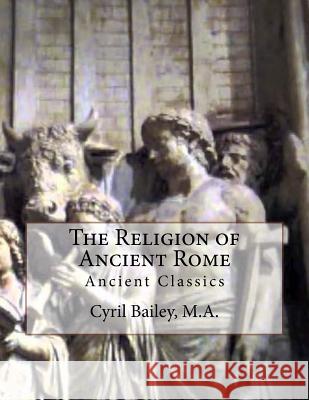The Religion of Ancient Rome: Ancient Classics » książka
The Religion of Ancient Rome: Ancient Classics
ISBN-13: 9781544740041 / Angielski / Miękka / 2017 / 64 str.
Religion in ancient Rome encompasses the ancestral ethnic religion of the city of Rome that the Romans used to define themselves as a people, as well as the adopted religious practices of peoples brought under Roman rule. The Romans thought of themselves as highly religious, and attributed their success as a world power to their collective piety (pietas) in maintaining good relations with the gods. According to legends, most of Rome's religious institutions could be traced to its founders, particularly Numa Pompilius, the Sabine second king of Rome, who negotiated directly with the gods. This archaic religion was the foundation of the mos maiorum, -the way of the ancestors- or simply -tradition-, viewed as central to Roman identity. As Rome came into contact with foreign cultures, and conquered them, foreign religions increasingly attracted devotees among Romans, who increasingly had ancestry from elsewhere in the Empire. The emperors promoted the Imperial cult around the empire, and this and imported mystery religions were generally practiced alongside the official religion. Ultimately, Roman polytheism was brought to an end with the adoption of Christianity as the official religion of the empire. The priesthoods of public religion were held by members of the elite classes. There was no principle analogous to separation of church and state in ancient Rome. During the Roman Republic (509-27 BC), the same men who were elected public officials might also serve as augurs and pontiffs. Priests married, raised families, and led politically active lives. Julius Caesar became pontifex maximus before he was elected consul. The augurs read the will of the gods and supervised the marking of boundaries as a reflection of universal order, thus sanctioning Roman expansionism as a matter of divine destiny. The Roman triumph was at its core a religious procession in which the victorious general displayed his piety and his willingness to serve the public good by dedicating a portion of his spoils to the gods, especially Jupiter, who embodied just rule. As a result of the Punic Wars (264-146 BC), when Rome struggled to establish itself as a dominant power, many new temples were built by magistrates in fulfillment of a vow to a deity for assuring their military success. Roman religion was thus practical and contractual, based on the principle of do ut des, -I give that you might give.- Religion depended on knowledge and the correct practice of prayer, ritual, and sacrifice, not on faith or dogma, although Latin literature preserves learned speculation on the nature of the divine and its relation to human affairs. Even the most skeptical among Rome's intellectual elite such as Cicero, who was an augur, saw religion as a source of social order. For ordinary Romans, religion was a part of daily life. Each home had a household shrine at which prayers and libations to the family's domestic deities were offered. Neighborhood shrines and sacred places such as springs and groves dotted the city. The Roman calendar was structured around religious observances. Women, slaves, and children all participated in a range of religious activities. Some public rituals could be conducted only by women, and women formed what is perhaps Rome's most famous priesthood, the state-supported Vestals, who tended Rome's sacred hearth for centuries, until disbanded under Christian domination.
Zawartość książki może nie spełniać oczekiwań – reklamacje nie obejmują treści, która mogła nie być redakcyjnie ani merytorycznie opracowana.











